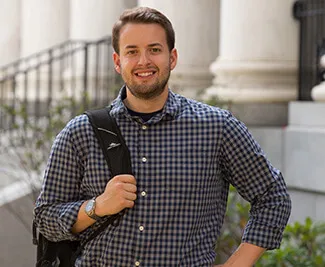Our featured graduate student in this issue of IMPACT is Justin Parent, a fifth-year doctoral candidate in UVM’s clinical and developmental psychology dual PhD program.
IMPACT: Justin, tell our readers where you are from and how you got interested in psychology, which as I understand it was also your undergraduate major at UVM as part of the Honors College.
Justin Parent: I was born in Sherbrooke, Quebec, but we moved to Vermont when I was five. As you noted, I studied psychology as an undergraduate at UVM. Clinical psychology and issues of psychopathology fascinated me when I initially enrolled at UVM. This interest led me to volunteer in Dr. Michael Zvolensky’s Anxiety and Health Research Lab as a research assistant. That work continued on a project for which I was awarded an Honors College URECA grant to examine the specificity of anxiety sensitivity on worry about bodily sensations among adults with HIV/AIDS.
While I found this topic interesting, in my last two years of undergrad I decided to focus my primary research experience on clinical child psychology. Thus I began working with Dr. Rex Forehand on several different projects broadly focused on applied clinical research working with children who are struggling with familial stress and, as a consequence, are at a heightened risk for developing psychopathology.
IMPACT: So you were involved in hands-on research as an undergrad, something that UVM is really working to increase. What inspired you to continue on with graduate studies at UVM?
JP: When I worked construction in high school, I wished for rain every day in the hopes that I wouldn’t have to shingle a roof that day. While carpentry is a fulfilling and important job for some, I knew that it was not the job that would inspire me to wake up every day looking forward to coming in to work. When I started working with Dr. Forehand, I discovered that I wanted to come in every day to do research and be involved in providing clinical services (especially on rainy days). This passion originally developed from being involved in several applied studies with implications for helping children and families. Being involved in these studies sparked my interest in research informing the development and dissemination of effective preventive interventions targeting at-risk youth and their families. I knew I wanted to stay at UVM for graduate study because of the reputation of the program and the great working relationship I had built with Dr. Forehand while I was an undergraduate.
IMPACT: I understand that you spent some time abroad this past summer. Tell us about that.
JP: I did — I spent a week this summer attending a brief course at the University of Oxford as part of the Oxford Mindfulness Research Center. I received a scholarship to attend the program and a training grant for the travel costs. It was my first time in Europe and I really enjoyed my time in Oxford and hope to go back soon (and only partially because it was like Hogwarts there).
IMPACT: Tell our readers about any awards or publications you have to your credit.
JP: I was fortunate to receive the American Psychological Association's Division 53 Student Achievement Award for contributions to the field of clinical child and adolescent psychology.
I have also received a Ruth L. Kirschstein National Research Service Award (NRSA) Individual Predoctoral Fellowship to Promote Diversity in Health-related Research from the Eunice Kennedy Shriver National Institute of Child Health and Human Development. My NRSA aims to examine the longitudinal influence of parental mindfulness on family health and child psychosocial well-being. The ultimate goal of my NRSA is to inform the development of mindfulness-based programs for families and children across diverse contexts.
During my time at UVM I have been able to disseminate my research at conferences and in top peer-reviewed journals for a total of 28 publications in journals such as Clinical Psychology Review, Development and Psychopathology, and Journal of Abnormal Child Psychology. Such success would not have been possible without the amazing mentorship of Dr. Forehand.
IMPACT: Twenty-eight publications already — that is really impressive! And I agree with you: Dr. Forehand and his colleagues in Psychology are an outstanding group. Tell us where you are in your graduate education and what you plan to do after graduating.
JP: I am a fifth-year doctoral candidate in the APA-accredited clinical and developmental psychology dual PhD program. I am currently applying to an internship that will begin in July 2016. After that year, my program will be complete and I hope to obtain a tenure-track academic position within a psychology department in a university or in a psychiatry department at an academic medical center.
IMPACT: Justin, thanks for your time and we wish you the best of luck in the future.
